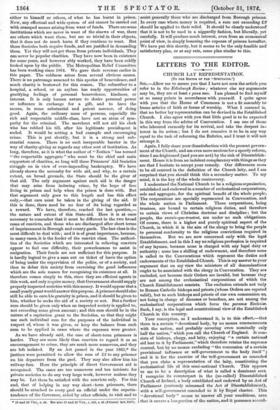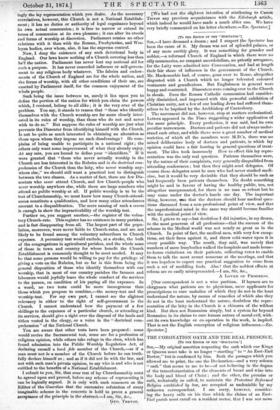LETTERS TO THE EDITOR.
CHURCH LAY REPRESENTATION.
(TO THE EnrrOa OF THE"SPECTATOR."]
Sre,—Allow me to assure you that I have not seen the article yore refer to in the Edinburgh Review ; whatever else my arguments may be, they are at least e penu meo. Jam pleased to find myself at so many points in accordance with yourself. I quite agree with you that the House of Commons is not a fit assembly to% frame articles of faith or forms of worship. What I contend is, that no better lay representation can be devised in the Established Church. I also agree with you that little good is to be expected in this way from the advice of Convocation. I am one of those who laboured earnestly for its revival, and take the deepest in- terest in its action ; but I do not conceive it to be in any way equal to the task of reforming the Rubrics, and I trust it will not attempt it.
Again, I fully share your dissatisfaction with the present govern- ment of the Church, and am even more anxious for a speedy reform, since Jam frightened (and you are not) by the risk of Disestablish- ment. Hence it is from no indolent complacencrwith things as they are that I hesitate to accept your remedy. Our differences seem to be all centred in the definition of the Church laity, and I am surprised that you should think this a secondary matter. To my mind, it is the key of the whole controversy.
I understand the National Church to be a religious organisation', established and endowed in a number of ecclesiastical corporations,. sole and aggregate, for the spiritual benefit of the whole people:. The corporations are specially represented in Convocation, and the whole nation in Parliament. These corporations, being trustees, are bound to certain religious duties, and therefore to certain views of Christian doctrine and discipline ; but the people, the cestuis-gue-trustent, are under no such obligations. Of course, there is a higher and purely spiritual aspect of the Church, in which it is the aim of the clergy to bring the people to personal conformity to the religious convictions required in themselves. But we are now concerned only with the legal Establishment, and in this I say no religious profession is required of any layman, because none is charged with any legal duty or authority ; none has a shilling of endowment, and therefore none is called to the Convocations which represent the duties and endowments of the Established Church. This is my answer to your argument that on my view the ministers of all denominations ought to be associated with the clergy in Convocation. They are excluded, not because their Orders are invalid, but because they are not among the ecclesiastical corporations of which the Church Establishment consists. The exclusion extends not only to Roman Catholic bishops and priests (whose Orders are reputed valid), but to such bishops and priests of our own communion asy not being in charge of dioceses or benefices, are not among the ecclesiastical corporations which form the persons Eeelesiw.. Such, I say, is the legal and constitutional view of the Established Church in this country.
Your conception, as I understand it, is to this effect,—that there is a certain "devotional body, by no means commensurate with the nation, and probably covering even nominally only half the nation," which you call the Church of England. It con- sists of bishops, clergy, and laity, enjoying "a certain national aid lent to it by Parliament," which therefore retains the supreme control, but by no means excluding "the concession of a certain provisional influence or self-government to the body itself " ; and it is for the exercise of the 'self-government so conceded that you claim a representation of the laity, constituting the ecclesiastical life of this semi-national Church. This appears to me to be a description of what is called a dominant sect. I recognise its counterpart in the (so-called) Disestablished Church of Ireland, a body established and endowed by an Act of Parliament (curiously misnamed the Act of Disestablishment), with a self-government conceded to it by Royal charter. This "devotional body" seems to answer all your conditions, save that it covers a less portion of the nation, and it possesses accord-
ingly the lay representation which you desire. As the necessary correlatives, however, this Church is not a National Establish- ment; it has no duties or authority of legal cognisance beyond its own actual communion ; it is free to narrow or extend its terms of communion at its own pleasure ; it can alter its creeds and forms of worship at discretion. Parliament retains no other relations with it than with the Roman, Presbyterian, and Wes- leyan bodies, over whom, also, it has the supreme control.
Now, I deny the existence of any such devotional body in England. Our laws know nothing of a Church covering less than half the nation. Parliament has never lent any national aid for such a purpose. It has never conceded influence or self-govern- ment to any religious body whatever. The fabrics and endow- ments of the Church of England are for the whole nation, and the forms of worship, with all other conditions of their use, are enacted by Parliament itself, for the common enjoyment of the 'whole people.
Such being the issue between us, surely it lies upon you to define the portion of the nation for which you claim the powers which, I contend, belong to all alike ; it is the very crux of the problem. You say, it stands to reason that "those who identify themselves with the Church worship are fax more closely inter- ested in its rules of worship, than those who do not and never wish to do so." But suppose the rules of worship are just what prevents the Dissenter from identifying himself with the Church. Is not he quite as much interested in obtaining an alteration as those upon whom they impose no such disadvantage ? He com- plains of being unable to participate in a national right ; the others only want some improvement of what they already enjoy. At any rate, you are bound to define your "identifiers." If it were granted that "those who never actually worship in the Church are less interested hi the Rubrics and in the doctrinal com- prehension of the Church than the laity, who never worship any- where else," we should still want a practical test to distinguish between the two classes. As a matter of fact, there are few Dis- senters who never attend Church, and few Church-people who never worship anywhere else, while there are large numbers who attend no public worship at all If public worship is to be the teat of Churchmanahip, we must know how many Church-attend- ances constitute a qualification, and how many other attendances amount to a disqualification. The mere naming of such a census is enough to show the impracticability of the worship test.
Further on, you suggest another,—the register of the volun- tary Church-rate. This register has no existence in many parishes, and is fast disappearing from all. The largest part of the popu- lation, moreover, were never liable to Church-rates, and are not likely to be found among the voluntary subscribers to Church expenses. A pecuniary test would exclude, at a stroke, the bulk of the congregations in agricultural parishes, and the whole mass of those in town and country for whose benefit the Church Establishment is commonly thought to be most needed. It may be that some persons would be willing to pay for the privilege of giving a vote on the Rubrics, but so far is this from being the general disposition of those who identify themselves with our worship, that in most of our country parishes the farmers and labourers would joyfully leave the whole conduct of the services to the parson, on condition of his paying all the expenses. In a word, no two tests could be more incongruous than those which you propose to combine,—the money-test and the worship-test. For my own part, I cannot see the slightest relevancy in either to the right of self-government in the Church. I cannot understand how the payment of a few shillings to the expenses of a particular church, or attending at its services, should give a right over the disposal of the lands and tithes vested in the clergy, or a voice in the "doctrinal com- prehension" of the National Church.
You are aware that other tests have been proposed : some would revive the Sacramental test, some are for a profession of religious opinion, while others take refuge in the sham, which has found admission into the Public Worship Regulation Act, of declaring oneself a bond fide member of the Church,—as if a man must not be a member of the Church before he can truth- fully declare himself so ; and as if it did not lie with the law, and not with each man's private opinion, to say who is and who is not entitled to the benefits of a National Establishment.
I submit to you, Sir, that some test of lay Churchmanship must be agreed upon and proved, before any scheme of representing it can be logically argued. It is only with such reasoners as the Editor of the Guardian that the successive refutation of every imaginable scheme in the concrete is held to prove a general acceptance of the principle in the abstract.—I am, Sir, &c.,
GEo. TnEvott.
[We had not the slightest intention of attributing to Canon Trevor any previous acquaintance with the Edinburgh article, which indeed he would have made a much abler one. We have very briefly commented on his letter elsewhere.—En. Spectator.]







































 Previous page
Previous page